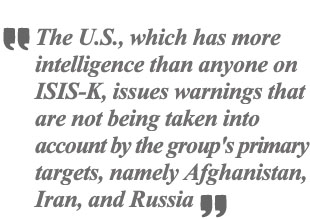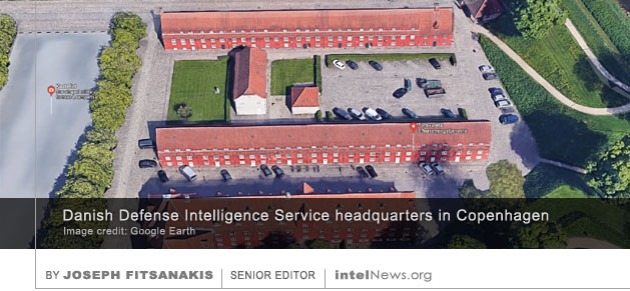March 9, 2020
by Joseph Fitsanakis
 The coronavirus (COVID-19) is quickly becoming the greatest security challenge of our time. The ease of transmission and high death rate of this disease, coupled with the asymmetric challenges it poses to our planet’s social, economic and political structures, threaten the very cohesion of our global system. This is especially true of Western societies, whose highly sophisticated organizational features make them especially susceptible to all forms of large-scale disruption. Few of those of us who are alive today in the West have ever faced a threat with the all-encompassing characteristics, disruptive capacity and persistent nature of COVID-19.
The coronavirus (COVID-19) is quickly becoming the greatest security challenge of our time. The ease of transmission and high death rate of this disease, coupled with the asymmetric challenges it poses to our planet’s social, economic and political structures, threaten the very cohesion of our global system. This is especially true of Western societies, whose highly sophisticated organizational features make them especially susceptible to all forms of large-scale disruption. Few of those of us who are alive today in the West have ever faced a threat with the all-encompassing characteristics, disruptive capacity and persistent nature of COVID-19.
But no American would get this impression by watching the daily briefings of the so-called White House “Coronavirus Task Force”. The uncomfortable smiles and awkward acquiescence of its members, part of an unconvincing effort to assure Americans that “all is well”, coupled with their seemingly unending competition to offer lavish praises to each other, make for a truly uncomfortable viewing experience. Such astounding manifestations of mediocrity would be somewhat tolerable if they came alongside actionable information that Americans could use to protect themselves and the future of their country —preferably something beyond “washing your hands for at least 20 seconds”.
viewing experience. Such astounding manifestations of mediocrity would be somewhat tolerable if they came alongside actionable information that Americans could use to protect themselves and the future of their country —preferably something beyond “washing your hands for at least 20 seconds”.
On February 26, Americans were told by their president that “within a couple of days [COVID-19 cases in the US would] be down close to zero, that’s a pretty good job we’ve done”. By that time, China was feverishly implementing the largest quarantine in human history. Ten days later, Italy began to quarantine 16 million people —a quarter of its population— in its northern regions. Meanwhile, Britain has begun re-hiring retired nurses to prepare for the coming unprecedented wave of medical emergencies, while France has banned all large meetings in its territory. But in America it’s business as usual: the National Collegiate Athletic Association (NCAA) announced on Sunday that all its tournament games nationwide will be held with fans despite growing concerns about the coronavirus. Not a single senior government official has stepped forward to address Americans’ growing anxiety about the potentially unprecedented degree of disruption that the US economy, including the nation’s supply chain, healthcare, transportation, education, entertainment, and services sectors are going to be experiencing in the coming months.
Additionally, Americans expect the so-called “Task Force” to provide non-politicized explanations of the ongoing failures of the US government’s treatment to the COVID-19 crisis, which continue to allow the virus to spread in our communities unabated. For instance, why did the US decline to use the World Health Organization’s diagnostic test for the disease, which had been made available to dozens of nations by the end of January? Or why does access to testing kits remain at alarmingly low levels, so much so that a frustrated New York Governor Andrew Cuomo recently described the US Centers for Disease Control and Prevention’s response to COVID-19 as “flat-footed”? So grave is this situation, that on March 8 The Washington Examiner —arguably America’s leading conservative publication— opined that COVID-19 “is exposing how deeply unsuited [Donald Trump] is to deal with a genuine crisis that he can’t bluff his way through”.
The American government’s tragically incompetent response to COVID-19 (at this point just slightly better than the Islamic Republic of Iran’s) hurts even more when one compares it with that of Taiwan —an island nation of 23 million, which the US often views as a client state. In January, when COVID-19 began making news headlines, experts predicted that Taiwan would end up with the world’s second-highest number of COVID-19 cases. This was primarily due to the country’s geographical proximity to mainland China —just 81 miles from the Chinese shore— as well as the  extensive transportation network that links the two nations. Over 1.2 million Taiwanese either live permanently or work in China, while nearly 3 million Chinese citizens visit Taiwan every year. Even more ominously, the COVID-19 outbreak occurred right before the Lunar New Year, which is the busiest travel season for both Chinese and Taiwanese holidaymakers.
extensive transportation network that links the two nations. Over 1.2 million Taiwanese either live permanently or work in China, while nearly 3 million Chinese citizens visit Taiwan every year. Even more ominously, the COVID-19 outbreak occurred right before the Lunar New Year, which is the busiest travel season for both Chinese and Taiwanese holidaymakers.
But Taiwan has managed to spectacularly defy all early predictions about a potential COVID-19 epidemic. As a group of researchers from the University of California Los Angeles, Stanford University, RAND Corporation and the Koo Foundation in Taiwan, explain in The Journal of the American Medical Association, the reason dates back to 2003. That year’s severe acute respiratory syndrome (SARS) outbreak prompted the Taiwanese government to establish the National Health Command Center (NHCC). Since then, the NHCC has operated as a central command system that coordinates the activities of Taiwan’s Central Epidemic Command Center, the Biological Pathogen Disaster Command Center, the Counter-Bioterrorism Command Center, and the Central Medical Emergency Operations Center. Intelligence collected and analyzed by these centers is quickly distributed to central, regional and local authorities in all parts of the country.
The authors explain that, on December 31, the day when the World Health Organization notified national authorities of the first accounts of a severe pneumonia with unknown causes in the Chinese city of Wuhan, NHCC personnel began to board planes arriving from Wuhan. They began testing all passengers and crew on those planes for flu-like symptoms before allowing them to deplane. By January 5, NHCC personnel were reaching out to anyone who had traveled to Wuhan in the past fortnight and testing them for flu-like symptoms. By that time, the NHCC had already set up a nationwide toll-free hotline, which has since become decentralized to serve individual regions.
On January 27, the NHCC worked in collaboration with Taiwan’s National Health Insurance Administration (NHIA) to integrate the database containing the recent travel history of passengers with their NHIA identification card data. They also integrated the same database with national tourism and immigration data. Within 24 hours, the NHCC was reaching out to all citizens of Taiwan, as  well as tourists and immigrants, who had traveled to the Wuhan region during the previous month. Using this big-data analytics approach, Taiwanese authorities were able to generate real-time alerts that were sent to individual doctors for use during clinical visits, so that clinical symptoms could be matched with patients’ travel histories.
well as tourists and immigrants, who had traveled to the Wuhan region during the previous month. Using this big-data analytics approach, Taiwanese authorities were able to generate real-time alerts that were sent to individual doctors for use during clinical visits, so that clinical symptoms could be matched with patients’ travel histories.
Those who had traveled to regions of China that were considered high-risk, were immediately quarantined at home for 14 days. Their movements were tracked through their mobile phones to ensure compliance with quarantine instructions. Meanwhile, all those who exhibited flu-like symptoms but had tested negative for influenza in weeks prior, were re-tested for COVID-19.
Considering the above, it is hardly surprising that, by March 9, Taiwan —located just 81 miles off the coast of China— had just 45 confirmed COVID-19 cases, with a single death. Importantly, this is not because the Taiwanese are not testing their citizens —unlike the US or, even more outrageously, Turkey, which continues to report zero cases of COVID-19. Taiwan has tested more people than all of the nations of the Americas combined. The low number of COVID-19 cases in Taiwan is due to one thing, and one thing alone: a preemptive approach to the security of the nation by an enlightened leadership and a forward-thinking government system. Which is precisely what the US lacks at this grave time for the nation’s future.
* Dr. Joseph Fitsanakis is associate professor in the Intelligence and National Security Studies program at Coastal Carolina University in the United States.
► Author: Joseph Fitsanakis | Date: 09 March 2020 | Permalink
 NO COUNTRY HAS BETTER intelligence on the Islamic State-Khorasan Province (known as ISIS-K) than the United States. American forces have faced ISIS-K almost from the moment the group was founded in 2015 in Pakistan, just a few miles from the Afghan border. It was there that a group of disaffected members of the Tehreek-e-Taliban-e-Pakistan (TTP, commonly referred to as the Pakistani Taliban) began turning their backs on al-Qaeda, which they saw as a failing brand, and joined the Islamic State of Iraq and Syria (ISIS).
NO COUNTRY HAS BETTER intelligence on the Islamic State-Khorasan Province (known as ISIS-K) than the United States. American forces have faced ISIS-K almost from the moment the group was founded in 2015 in Pakistan, just a few miles from the Afghan border. It was there that a group of disaffected members of the Tehreek-e-Taliban-e-Pakistan (TTP, commonly referred to as the Pakistani Taliban) began turning their backs on al-Qaeda, which they saw as a failing brand, and joined the Islamic State of Iraq and Syria (ISIS). not being taken into consideration by the group’s primary targets, namely Afghanistan, Iran, and Russia. Indeed, despite the Washington’s best efforts, its warnings about pending ISIS-K attacks have been ignored by the group’s primary targets. A few days after an ISIS-K attack killed nearly 100 people in Kerman, Iran, The Wall Street Journal claimed the U.S. government had provided Tehran with “a private warning” of an imminent terrorist threat from ISIS-K. If that is true, then the Iranians clearly did not heed Washington’s warning.
not being taken into consideration by the group’s primary targets, namely Afghanistan, Iran, and Russia. Indeed, despite the Washington’s best efforts, its warnings about pending ISIS-K attacks have been ignored by the group’s primary targets. A few days after an ISIS-K attack killed nearly 100 people in Kerman, Iran, The Wall Street Journal claimed the U.S. government had provided Tehran with “a private warning” of an imminent terrorist threat from ISIS-K. If that is true, then the Iranians clearly did not heed Washington’s warning. SINCE OCTOBER 7, 2024, when Israel was caught off guard by a sudden and highly damaging attack from Hamas, more information has surfaced regarding why there was no prior warning about the attack and the failures of Israeli intelligence in this regard.
SINCE OCTOBER 7, 2024, when Israel was caught off guard by a sudden and highly damaging attack from Hamas, more information has surfaced regarding why there was no prior warning about the attack and the failures of Israeli intelligence in this regard. capabilities. Another important insight is that the counterintelligence structures inside Hamas were successful in preventing Israeli intelligence from recruiting agents who were close enough to Sinwar to be able to alert Israel about the impending attack. Furthermore, Israel’s collection and analysis of signals intelligence was unproductive, possibly because Hamas was successful in countering Israel’s ability to produce effective intelligence from signals intercepts.
capabilities. Another important insight is that the counterintelligence structures inside Hamas were successful in preventing Israeli intelligence from recruiting agents who were close enough to Sinwar to be able to alert Israel about the impending attack. Furthermore, Israel’s collection and analysis of signals intelligence was unproductive, possibly because Hamas was successful in countering Israel’s ability to produce effective intelligence from signals intercepts.
 THE FIRST CLAIMS OF an alleged secret collaboration between the signals intelligence agencies of the United States and Denmark surfaced in November of 2020. By January of this year, it was clear that the Danish government would, sooner or later, need to deal with the fallout of its controversial spy deal with Washington, under which Denmark enabled the US to spy on some of its closest European allies. Still, the
THE FIRST CLAIMS OF an alleged secret collaboration between the signals intelligence agencies of the United States and Denmark surfaced in November of 2020. By January of this year, it was clear that the Danish government would, sooner or later, need to deal with the fallout of its controversial spy deal with Washington, under which Denmark enabled the US to spy on some of its closest European allies. Still, the  LAST MONTH I WROTE an
LAST MONTH I WROTE an 
 The coronavirus (COVID-19) is quickly becoming the greatest security challenge of our time. The ease of transmission and
The coronavirus (COVID-19) is quickly becoming the greatest security challenge of our time. The ease of transmission and  viewing experience. Such astounding manifestations of mediocrity would be somewhat tolerable if they came alongside actionable information that Americans could use to protect themselves and the future of their country —preferably something beyond “washing your hands for at least 20 seconds”.
viewing experience. Such astounding manifestations of mediocrity would be somewhat tolerable if they came alongside actionable information that Americans could use to protect themselves and the future of their country —preferably something beyond “washing your hands for at least 20 seconds”. extensive transportation network that links the two nations. Over 1.2 million Taiwanese either live permanently or work in China, while nearly 3 million Chinese citizens visit Taiwan every year. Even more ominously, the COVID-19 outbreak occurred right before the Lunar New Year, which is the busiest travel season for both Chinese and Taiwanese holidaymakers.
extensive transportation network that links the two nations. Over 1.2 million Taiwanese either live permanently or work in China, while nearly 3 million Chinese citizens visit Taiwan every year. Even more ominously, the COVID-19 outbreak occurred right before the Lunar New Year, which is the busiest travel season for both Chinese and Taiwanese holidaymakers. well as tourists and immigrants, who had traveled to the Wuhan region during the previous month. Using this big-data analytics approach, Taiwanese authorities were able to generate real-time alerts that were sent to individual doctors for use during clinical visits, so that clinical symptoms could be matched with patients’ travel histories.
well as tourists and immigrants, who had traveled to the Wuhan region during the previous month. Using this big-data analytics approach, Taiwanese authorities were able to generate real-time alerts that were sent to individual doctors for use during clinical visits, so that clinical symptoms could be matched with patients’ travel histories.





